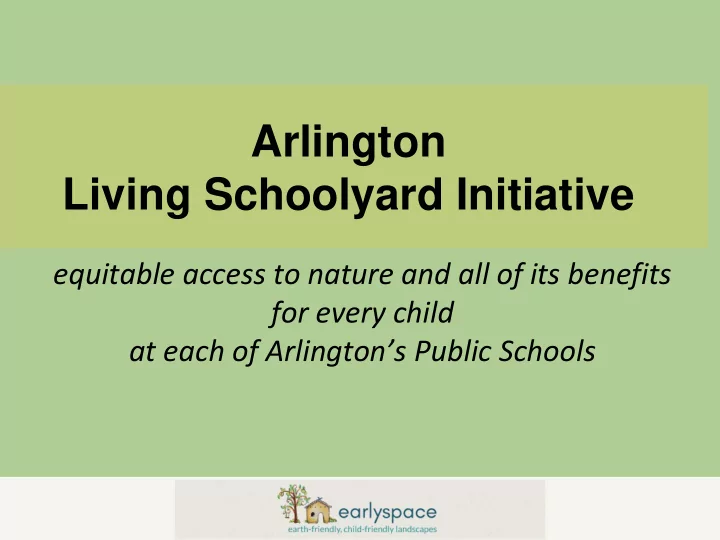

Arlington Living Schoolyard Initiative equitable access to nature and all of its benefits for every child at each of Arlington’s Public Schools
9 Reasons Why Nature is Good for Children
Kids need nearby nature. How children lost the right to roam in four generations David Derbyshire, Daily Mail 2007
Nature makes us healthier Children in Swedish Outdoors-in-all-weather schools were sick less often and had lower blood pressure than children in traditional Swedish preschools. Patrik Grahn, Swedish Land Grant University
Nature Improves Attention Kids with ADHD who spend time outside in green spaces are more focused, attentive and cooperative when they come indoors. Attention Restoration Theory proposes that contact with nature restores and redirects one’s attention to the current task at hand. The theory postulates that mental fatigue increases irritation, distraction, and stress and decreases the ability to concentrate. In order to counter the effects of fatigue and restore mental acuity, the theory proposes that clearing the mind, redirecting attention, dealing with unresolved concerns, and reflecting on priorities can all be better achieved in a supportive environment that includes green vegetation Taylor Faber and Frances Kuo Landscape and Human Health Lab University of Illinois 2001, 2004, 2009
Nature Doubles Attention Span Teachers teaching lessons Dr Frances Kuo University of Illinois 2018 outdoors had to redirect half as often.
Nature Improves Test Scores The proportion of tree cover, as distinct from other types of “green space” such as grass, was found to be a significant positive predictor of student performance, accounting for 13% of the variance explained in a statistical model predicting mean student performance assessments. The effects of tree cover and species composition were most pronounced in schools that showed the highest level of external challenges, suggesting the importance of urban forestry investments in these schools. Tree cover and species composition effects on academic performance of primary school students. ”Ring Around the Tree” Fuji Kindergarten designed by Tezuka Architects By Sivajanani Sivarajah, Sandy M. Smiith and Sean Thomas PLOS 2018 https://journals.plos.org/plosone/article?id=10.1371/j ournal.pone.0193254
Nature Inspires Active Play The average child spends 12.6 minutes per day on vigorous outdoor activity vs. 10.4 waking hours motionless. Children who play on playgrounds that incorporate natural elements like boulders, logs and plants tend to be more active than those who play on traditional playgrounds with metal and brightly colored equipment. They also appear to use their imaginations more. University of Tennessee at Knoxville (2012, October 11). ScienceDaily
Nature helps kids see Time outdoors in the light of nature has been shown to be one clear factor related to the incidence of myopia in children. In a study that compared Chinese children in Singapore where the rate of myopia has risen to 29% with Chinese children in Sydney where the level is only 3.3%, investigators found that children spent about the same amount of time looking at screens, but Australian children were outside an average of 14 hours a week while the children in Asia were outside only 3 hours a week. Sing-Mei Saw National University of Singapore and Katherine Rose, University of Sydney, 2008 Archives of Ophthalmology
Nature Makes Kids Smarter (and happier!) Mycobacterium vaccae, commonly found in soil, decreases anxiety and improves learning ability. Science Daily (May 25, 2010) — 110th General Meeting of the American Society for Microbiology in San Diego
Terrain
Tree parts 14
Balancing
Digging, Lifting, Pushing, Pulling
Science and math: measuring and observing.
18
Literacy in the Garden
Edible
Schoolyard Wildlife Habitats
Stormwater management
Sand and Water
Empowering kids
Next Steps 1. Read the whitepaper to learn about how other school systems are doing this: policies, training, maintenance, and funding. 2. Share your thoughts, questions, comments to arlingtonlivingschoolyards@gmail.com 3. Endorse the Arlington Living Schoolyard Initiative. 4. Send a rep to the ALSI Task Force when it launches.
Recommend
More recommend